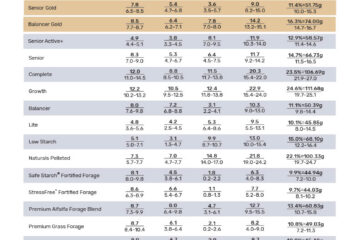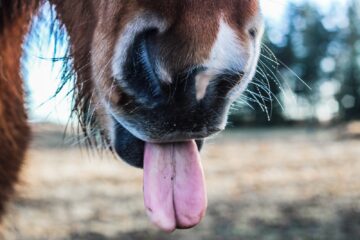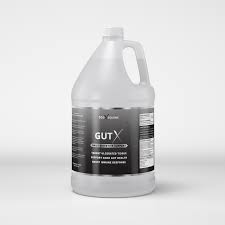Feed Review: Thrive Feed for Horses
“The feed decision you make dramatically affects your horse’s quality of life, health, and how long they remain active and useful. First and foremost, horses are grass eaters, not grain eaters, or fat eaters, or sugar beet eaters. Their digestive system requires a low-fat diet, just like grass, to create and sustain vibrant health. I questioned everything about the profit-driven horse feed industry and did the opposite. Why? Because horses are my lifetime passion, and I am determined to be there for people’s horses, giving them what they need, not what people want. Thrivefeed is a low fat, highly useful tool to achieve outstanding results.”
This is lifted directly from the home page of this company’s website and I thought it was the perfect place to start a feed review because I actually agree with the idea that horses are grass eater. However, there are some glaring inconsistencies to point out in this statement.
“First and foremost horses are grass eaters.”
Absolutely correct. You’ll get no argument from me that the foundation for any good equine diet is forage. Good grass hay or suitable pasture is paramount in keeping horses healthy.
However, because our horses work or have special conditions including geriatric since we are keeping them alive well past their natural design limit, supplemental feeds should provide all the additional calories and nutrients that aren’t available in grass forage alone.
“I questioned everything about the for profit horse feed industry and did the opposite.”
“For profit”. I checked, this company is not a 501c3 non-profit organization so I would have to assume that the objective for this business enterprise is to turn a profit.
He certainly did the opposite of the “for profit” feed companies by producing a truly half assed feed instead of a product that would actually benefit a horse eating forage already.
“Because horses are my lifetime passion”
If that’s true, and you wanted to design a feed why didn’t you go to school to obtain your equine nutrition PhD?
Or take a single course in equine nutrition?
Or retain the services of a qualified equine nutrition PhD to help you design this feed?
This is just the tip of the iceberg.
There are so many boutique feeds coming out that are targeted for the “discriminating horse owner” who is looking for an alternative to the mainstream commercial feeds. The unfortunate thing is that the majority of these feeds, I won’t say all because there may be one that actually has something more than marketing behind it but I have yet to discover it.
It comes down to research, formulation, testing, performance and nutrition. Thrive Horse Feed has none of these things behind it. Further, the marketing is hilariously duplicitous and heavy handed making Thrive Horse Feed the ideal example of what to look for to avoid wasting your money on these type feeds.
A Feed Founded in Narcissism
Dale Moulton seems to be the driving force behind Thrive Feed. He emphasizes his “lifelong love of horses” and uses all kinds of superlatives to describe his passion, his “technology” and his commitment to making all horses healthier.
Nobody on earth is more committed to horses than Dale. The “Mission” page of the website shows Dale riding bareback leading a line of wild horses. Amazing!
His Facebook page is filled with photos of him on horses, with horses, near horses, etc. We get it. He loves horses.
I, myself, love horses. I am passionate about helping horses be healthier. I have attended hundreds of hours of clinics and conferences and trainings about feeding horses yet I have not, nor will I ever design my own feed. Why? Because I’m not qualified!
Nowhere in all of the self regaling information Dale provides does he indicate any formal training in equine nutrition or feed formulation. None. Zero.
Call me old fashioned but I would think that if someone was truly committed to feeding horses that they would have made an effort to seek some formal training and education to support the cause.
“Lifelong Love of Horses” is a Common Theme
Many of the boutique feed and supplement companies have been founded by people who have some extensive background in horses going back to their youth and even past generations.
I have been caring for horses for twenty years and I’ve gained an encyclopedia’s worth of knowledge and I’m still not qualified to design a feed.
I can do a decent hoof trim but I’m not a farrier.
I can handle a young horse but I’m not a trainer.
I can give injections, fix wounds, manage lameness but I am not a veterinarian.
My point is that just because you have been around horses since birth does not make you a subject matter expert in certain specialties unless you have been formally educated and qualified in those areas.
Try this. Study flying an airplane for twenty years without ever taking a lesson. Read everything you can. Talk to a thousand pilots. Now hop into a 737 and fly it. I won’t be on board for sure.
Being around horses your whole life in no way qualifies you as an equine nutritionist nor will it help you design a feed.
Where is the Research, Development and Testing?
In all the heavy handed self-promotion on the website there isn’t a single mention of how the feed was designed, developed and tested. Nothing.
The feed bases it’s quality on the theory of quality ingredients. Don’t even get me started on the whole “Non GMO” thing since it is totally meaningless.
Sun dried alfalfa? How do we know it’s really sun dried? Most hay dries in the sun so what’s the big deal? Is there a difference between sun dried and barn dried? Actually, there is. Barn dried alfalfa is much more consistent in it’s curing and moisture content. It’s also expensive and not very common.
Sorghum grains. Sorghum is never recommended for feeding horses because of the risk of high concentrations of prussic acid aka cyanide.
What about testing of the ingredients? Is Dale testing every batch of ingredients for toxins? Nutrient levels?
Most major feed companies test every single batch of ingredients that shows up at the mill. On site in real time.
Everything Comes Down to the Guaranteed Analysis
Dale’s theory is that his feed should emulate high quality forage and he succeeds at this effort. Since the ingredients are largely forages it should be no surprise that the GA is very similar to high quality forage.
My question is, “Why not just feed high quality forage?”
If the best thing for horses is quality forage then feed it. Of course forage quality and availability changes from region to region and year to year so I suppose Thrive would make a good albeit expensive forage replacement but hay pellets and beet pulp would do just as well if not better for less money.
A supplemental feed should be designed to supplement the calories and nutrients lacking in forage to compensate for age, workload and condition.
There is no Lysine on the GA
The copper and zinc levels are way too low to supplement pasture or forage.
There’s almost no vitamin E.
I’m not sure what this feed DOES have other than micro processing, enzyme supressing yadda, yadda bullshit.
The bottom line is this feed isn’t worth your time or money. It’s not going to hurt any horses but it surely isn’t going to help any.


